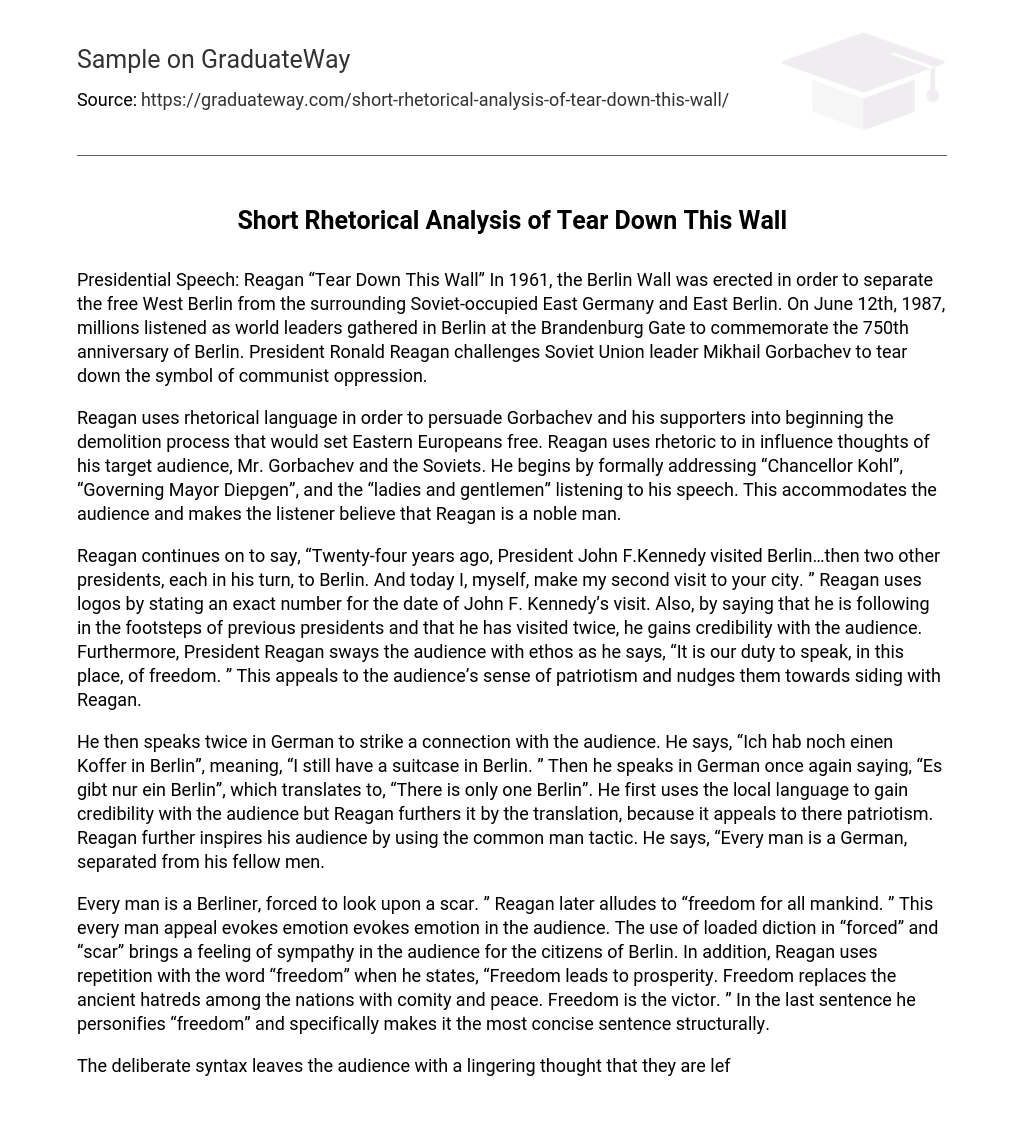Presidential Speech: Reagan “Tear Down This Wall” In 1961, the Berlin Wall was erected in order to separate the free West Berlin from the surrounding Soviet-occupied East Germany and East Berlin. On June 12th, 1987, millions listened as world leaders gathered in Berlin at the Brandenburg Gate to commemorate the 750th anniversary of Berlin. President Ronald Reagan challenges Soviet Union leader Mikhail Gorbachev to tear down the symbol of communist oppression.
Reagan uses rhetorical language in order to persuade Gorbachev and his supporters into beginning the demolition process that would set Eastern Europeans free. Reagan uses rhetoric to in influence thoughts of his target audience, Mr. Gorbachev and the Soviets. He begins by formally addressing “Chancellor Kohl”, “Governing Mayor Diepgen”, and the “ladies and gentlemen” listening to his speech. This accommodates the audience and makes the listener believe that Reagan is a noble man.
Reagan continues on to say, “Twenty-four years ago, President John F.Kennedy visited Berlin…then two other presidents, each in his turn, to Berlin. And today I, myself, make my second visit to your city. ” Reagan uses logos by stating an exact number for the date of John F. Kennedy’s visit. Also, by saying that he is following in the footsteps of previous presidents and that he has visited twice, he gains credibility with the audience. Furthermore, President Reagan sways the audience with ethos as he says, “It is our duty to speak, in this place, of freedom. ” This appeals to the audience’s sense of patriotism and nudges them towards siding with Reagan.
He then speaks twice in German to strike a connection with the audience. He says, “Ich hab noch einen Koffer in Berlin”, meaning, “I still have a suitcase in Berlin. ” Then he speaks in German once again saying, “Es gibt nur ein Berlin”, which translates to, “There is only one Berlin”. He first uses the local language to gain credibility with the audience but Reagan furthers it by the translation, because it appeals to there patriotism. Reagan further inspires his audience by using the common man tactic. He says, “Every man is a German, separated from his fellow men.
Every man is a Berliner, forced to look upon a scar. ” Reagan later alludes to “freedom for all mankind. ” This every man appeal evokes emotion evokes emotion in the audience. The use of loaded diction in “forced” and “scar” brings a feeling of sympathy in the audience for the citizens of Berlin. In addition, Reagan uses repetition with the word “freedom” when he states, “Freedom leads to prosperity. Freedom replaces the ancient hatreds among the nations with comity and peace. Freedom is the victor. ” In the last sentence he personifies “freedom” and specifically makes it the most concise sentence structurally.
The deliberate syntax leaves the audience with a lingering thought that they are left to chew on. Next, Reagan reaches the climax of his speech as he calls upon Gorbachev directly: “General Secretary Gorbachev, if you seek peace, if you seek prosperity for the Soviet Union and Eastern Europe, if you seek liberalization: Come here to this gate! Mr. Gorbachev, open this gate! Mr. Gorbachev, tear down this wall! ” Singling Gorbachev out and demanding for freedom evokes pride in the German citizen’s heart and persuades Gorbachev into giving the people what they want, freedom.





